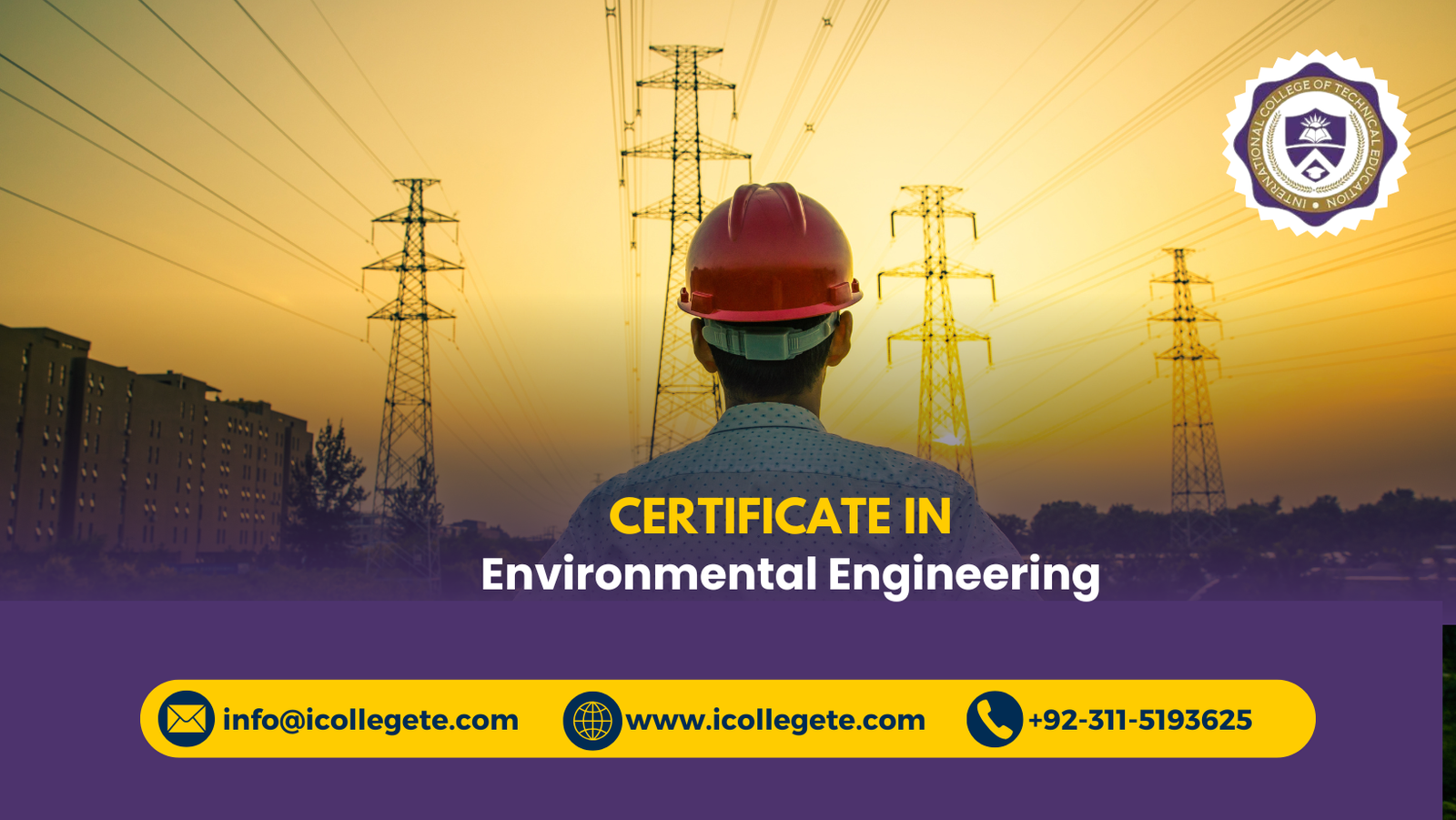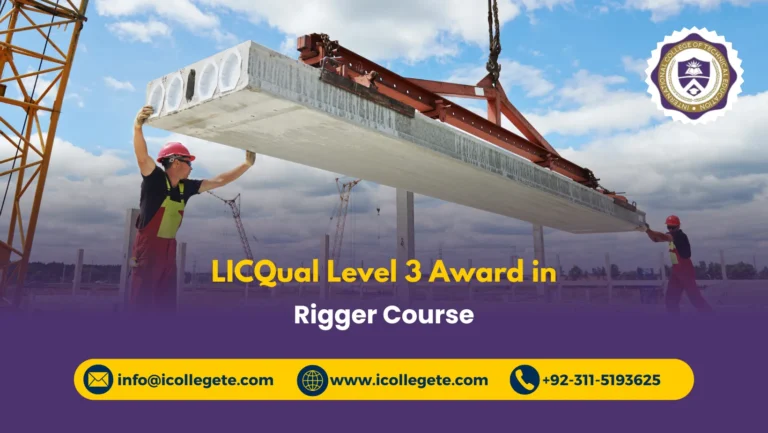Environmental engineering is a crucial field that focuses on the design and implementation of systems and technologies that protect the environment and improve the quality of life for communities. The Environmental Engineering Course in Islamabad is designed for individuals who are passionate about environmental sustainability and wish to pursue a career in solving environmental problems through engineering solutions. This course offers a thorough understanding of environmental systems, pollution control, water treatment, waste management, and sustainable practices, making it an essential program for aspiring engineers in the field.
The Environmental Engineering Course in Islamabad provides participants with an in-depth understanding of the principles and practices involved in the protection and preservation of the environment. As the world faces increasing environmental challenges, there is a growing demand for skilled professionals who can design and implement engineering solutions to address issues like pollution, resource depletion, and climate change. This course equips students with the knowledge and practical skills necessary to develop sustainable solutions for managing environmental challenges. It prepares individuals for roles that require both technical expertise and a deep commitment to environmental conservation.
This course covers a wide range of topics in environmental engineering, blending theory with practical application. Students will learn about the various engineering solutions to address environmental problems such as air and water pollution, waste management, energy efficiency, and the impact of human activities on the environment. The course also introduces students to environmental laws and regulations, ensuring that they are equipped to work in compliance with local and international standards.
The program aims to provide a solid foundation in environmental science and engineering, allowing participants to understand the complex interactions between technology and nature. The course content includes the study of environmental systems, renewable energy, environmental impact assessment, and sustainable urban planning, preparing students for careers in industries ranging from construction and manufacturing to government and consultancy.
Study Units
The Environmental Engineering Course in Islamabad typically includes the following study units:
- Introduction to Environmental Engineering
- Basics of environmental engineering and its significance
- Environmental issues and challenges facing society today
- Water Resources Management
- Water treatment processes and technologies
- Water conservation and wastewater management
- Design of water distribution and treatment systems
- Air Pollution Control
- Sources of air pollution and its effects
- Methods and technologies for controlling air pollutants
- Air quality monitoring and regulation
- Solid Waste Management
- Principles of waste management and reduction
- Techniques for recycling, composting, and waste treatment
- Sustainable approaches to waste disposal
- Environmental Impact Assessment (EIA)
- Techniques for assessing the environmental impacts of projects
- Legal and regulatory frameworks for EIA
- Implementing mitigation measures to reduce negative environmental effects
- Renewable Energy and Sustainability
- Solar, wind, and other renewable energy sources
- Design and implementation of sustainable energy systems
- Role of renewable energy in reducing environmental impact
- Environmental Law and Policy
- Overview of environmental regulations and compliance
- International environmental treaties and protocols
- Policy-making and its influence on environmental protection
- Sustainable Urban Planning and Development
- Principles of green building design and sustainable architecture
- Urban planning for environmental sustainability
- Reducing the ecological footprint of cities
- Climate Change and Global Environmental Issues
- Understanding the science of climate change
- Global strategies for climate mitigation and adaptation
- Environmental risk management in the context of climate change
- Environmental Engineering Laboratory Practices
- Hands-on training in environmental engineering techniques
- Laboratory experiments related to water treatment, air pollution, and waste management
Learning Outcomes
Upon successful completion of the Environmental Engineering Course in Islamabad, participants will be able to:
- Understand the principles of environmental engineering and its role in solving environmental challenges
- Design and implement water treatment and wastewater management systems
- Apply air pollution control techniques and understand air quality monitoring
- Develop sustainable solid waste management strategies and recycling programs
- Conduct environmental impact assessments and create plans to mitigate environmental damage
- Implement renewable energy solutions in various engineering projects
- Interpret and comply with environmental laws, regulations, and policies
- Contribute to sustainable urban development and green infrastructure
- Understand and address the implications of climate change on engineering projects
- Apply practical skills in environmental engineering laboratory settings
Course Benefits
The Environmental Engineering Course offers a wide range of benefits for both individuals and organizations:
- Specialized Knowledge: Participants gain expertise in key areas of environmental engineering, which are increasingly important in today’s world.
- Career Advancement: The course provides students with the qualifications and skills needed to pursue advanced roles in the environmental engineering field.
- Sustainable Practices: Students will learn how to incorporate sustainability into engineering projects, aligning with global efforts to reduce environmental impact.
- Industry Demand: With growing environmental concerns, there is an increasing demand for qualified environmental engineers, making this course a valuable investment for career growth.
- Hands-on Learning: The course includes practical training that allows students to gain real-world experience and build technical skills that are directly applicable in their careers.
- Global Recognition: The skills and knowledge gained from this course are applicable worldwide, offering opportunities to work on international projects and in various industries.
- Improved Problem-Solving Skills: The course encourages students to approach environmental problems with innovative and effective engineering solutions.
Who is This Course For?
The Environmental Engineering Course in Islamabad is designed for individuals who are interested in pursuing a career in environmental engineering or related fields. It is particularly suitable for:
- Aspiring Environmental Engineers: Individuals seeking to build a career in environmental engineering and work on solutions for pollution control, water treatment, and sustainable development.
- Civil Engineers: Professionals in civil engineering who want to specialize in environmental aspects of construction and urban development.
- Environmental Consultants: Those looking to enter the field of environmental consultancy, helping businesses and governments implement sustainable practices.
- Government Officials: Individuals working in regulatory bodies or environmental agencies who need to understand the technical and legal aspects of environmental management.
- Graduates of Related Fields: Students with backgrounds in engineering, science, or environmental studies who wish to specialize in environmental engineering.
- Corporate Sustainability Managers: Professionals responsible for managing sustainability initiatives in organizations and industries.
Future Progression for This Course
Upon completing the Environmental Engineering Course, individuals have several pathways for further development in their careers:
- Master’s Degree in Environmental Engineering: Graduates can pursue advanced studies to deepen their expertise and expand their career opportunities in research or specialized engineering roles.
- Professional Certifications: Certification programs like LEED (Leadership in Energy and Environmental Design) or those offered by environmental engineering bodies can further enhance a graduate’s qualifications.
- Project Management Roles: Professionals may take on leadership roles, managing large-scale environmental projects and teams working on sustainability initiatives.
- Consultancy: Graduates may choose to establish their own consultancy firm, providing environmental engineering services to businesses, governments, and non-profits.
- Public Policy and Advocacy: Some graduates may move into environmental policy roles, working for government agencies or non-governmental organizations (NGOs) to promote sustainable practices and environmental legislation.
The Environmental Engineering Course in Islamabad is a comprehensive training program designed to equip individuals with the technical and practical knowledge needed to tackle environmental challenges. By offering expertise in water and air pollution control, waste management, sustainability, and renewable energy, the course prepares students for rewarding careers in environmental engineering. As global environmental concerns continue to rise, skilled professionals in this field are in high demand, making this course an excellent choice for those looking to make a positive impact on the environment while advancing their careers.





